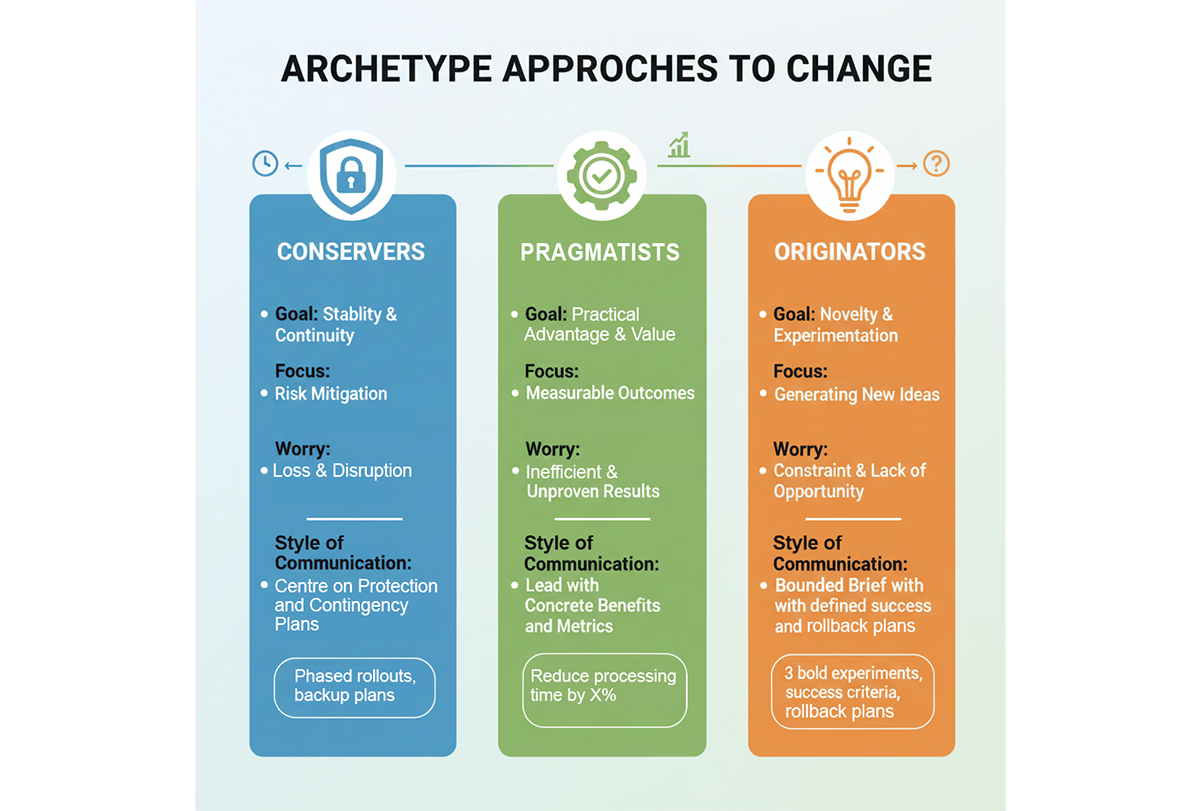
It will come as no surprise that change caused by disruptions has become the new status quo. As organisations battle with these industry shifts, much of the focus is often placed on why change is necessary.
When emerging leaders, middle managers and team leads alike are asked to implement that change, their choices determine whether teams adapt effectively or performance declines.
The idea of change management isn’t new either. Change management is the structured approach used to transition people, teams and organisations from one state to another. It combines planning, stakeholder engagement, implementation and continuous monitoring.
For these emerging leaders, this responsibility arrives before they feel fully equipped, which creates pressure and even more uncertainty. These situations spotlight a leader’s capability to inspire and motivate their teams through change.
Why do emerging or first-time leaders struggle with change management?
New leaders often enter their roles with strong technical expertise and the interpersonal skills needed to hold teams together. Yet change moments expose gaps that routine leadership rarely does.

Imposter syndrome creeps in and intensifies when directives from the top and the morale in the team shift. That pressure either makes or breaks how teams can maintain performance while going through organisational change.
So, success depends less on the plan itself and more on how it’s translated into everyday practice.
Dr Flocy Joseph
Senior Deputy Director, Head of Commercial
SMU Executive Development
How leaders react to change defines the success of team management strategies
In SMU Executive Development's Team Lead Programme on Agility & Effective Management, it highlights that the success of any team management strategy should start with fully understanding oneself to better lead a team.
Using the Change Style Indicator as a psychometric self-assessment, it categorises how people typically respond to change into three archetypes: Conservers, Pragmatists, and Originators. These archetypes also help leaders predict likely reactions, surface blind spots, and design interventions that align with how people make decisions under pressure.
Leaders who assume everyone processes change the same way would be in for a shock when well-laid plans meet resistance. By contrast, leaders who know their own style and their team’s mix can communicate in ways that reduce friction, design pilots that generate evidence, and match talent to tasks that accelerate adoption. That’s the essence of effective change management leadership.
How supporting different archetypes help manage high performance teams

respond to change into three archetypes: Conservers, Pragmatists, and Originators.
For the Conservers
- Conservers value stability, familiar routines and tested solutions. When faced with change, they tend to prioritise risk mitigation and continuity.
- This archetype highlights predictable biases such as loss aversion (overweighting potential losses), the endowment effect (overvaluing the status quo), and status quo bias (preferring existing arrangements).
- When a conserver needs reassurance, use a script that centres on protection when informing them of the change. For example, it could sound like “We are introducing this change in phases… here is what we will aim to achieve, and here are the contingency plans if things don’t work.”
For the Pragmatists
- Pragmatists focus on what works. They evaluate options through practicality. “Does this improve outcomes in a measurable way?” Pragmatists carefully weigh the costs and benefits of different options and choose the one that provides the greatest practical advantage and value.
- Their strengths are in translating strategy or abstract ideas and outcomes into workable processes, but may fall prey to confirmation bias, where they seek evidence that supports existing heuristics or become overly focused on the presentability of short-term results.
- For pragmatists, it’s best to lead with concrete benefits and information in navigating change. “This change reduces processing time by X% and here’s the first metric we’ll monitor.”
For the Originators
- Unlike the Pragmatist, Originators are comfortable with novelty and ambiguity. They enjoy generating ideas, embrace experimentation and tolerate uncertainty (to an extent).
- Their creative energy is a strategic asset, but they can be susceptible to novelty bias (overvaluing newness), overconfidence in early hypotheses, and framing effects that lead them to interpret ambiguous signals optimistically.
- For originators, create a bounded brief: “We want three bold experiments this month; each must define a measurable success criterion and a rollback plan.”
What does this mean for team leaders?
In essence, understanding these archetypes is not about labels but anticipating reactions and designing approaches to change management that would complement your team’s dynamics i.e. conservers stabilise, pragmatists operationalise, and originators innovate.
"Leading change is a defining milestone for new and emerging leaders. But it can also be a growth. The shift from manager to a leader is less about mastering frameworks and more about combining self-knowledge, behavioural insight and disciplined practice. The right team management approach preserves current performance while building future capability," says Dr Flocy.
In an era where the ability to influence behaviour change in teams separates adaptive organisations from the rest, selective professional development that combines self-insight and applied tools makes all the difference.
If you’re looking to develop these leadership skills before an untimely change or organisation, SMU’s Team Lead Programme on Agility & Effective Management integrates psychometric diagnostics, behavioural science and experiential learning to help emerging leaders lead confidently through complexity.
Discover more of our bespoke SMU Executive Development courses and programmes.